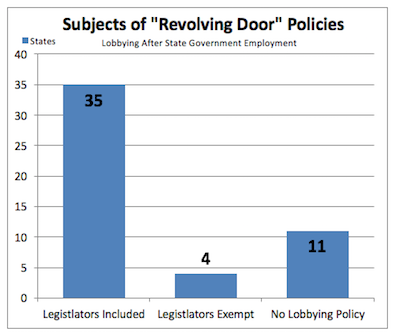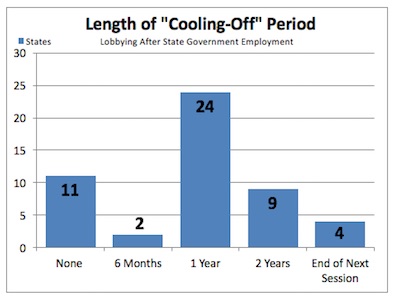

Latest Post | Last 10 Posts | Archives
Previous Post: Rauner reacts positively to Madigan “embracing economic changes”
Next Post: Today’s number: 50 percent
Posted in:
* From the Illinois Campaign for Political Reform…
39 states require public employees to take a “cooling off” period after leaving the state before engaging in lobbying activities. Of those, 35 have policies that also place these restrictions on state legislators. These policies serve to prevent special interests from using any increased influence a recently departed employee may have on former colleagues.
In Illinois, there is a one-year “cooling off” period for state employees, as established by an Executive Order signed by Governor Rauner in January of 2015. However, Illinois is one of just four states whose “cooling off” restrictions for lobbying do not apply to members of the General Assembly. ICPR’S research team found that only three other states with a “Revolving Door” lobbying policy do not include legislators: New Mexico, Texas, and Wisconsin.
The length of the “cooling off” period also varies from state to state. Illinois’ one-year waiting period is standard, with 24 states requiring a year break before lobbying. Nine states require a two year period, and two states, Missouri and North Carolina, require only 6 months.
There are 11 states with no “Revolving Door” lobbying policy in place: Idaho, Kansas, Mississippi, Nebraska, New Hampshire, North Dakota, Ohio, Oklahoma, Vermont, Washington, and Wyoming.
* A caveat…
There are two types of laws that are often referred to as “Revolving Door” policies. First, some states ban former state employees and elected officials from working for any company with a state contract that the employee oversaw or helped create. Illinois law includes this type of restriction for state employees. In this study, we focused only on the second type of “Revolving Door” policy, which restricts former public employees and elected officials from lobbying the state for a certain period after their departure.
* A couple of charts…


posted by Rich Miller
Wednesday, Jan 11, 17 @ 10:38 am
Sorry, comments are closed at this time.
Previous Post: Rauner reacts positively to Madigan “embracing economic changes”
Next Post: Today’s number: 50 percent
WordPress Mobile Edition available at alexking.org.
powered by WordPress.
Aren’t the loopholes pretty big here?
For example, Nuding took a job at IHA with all sorts of titles. Is he really not going to “lobby” for a year?
Lefty Rosenthal had the “food and beverage” gig at the Stardust, but he still ran the casino.
Comment by wordslinger Wednesday, Jan 11, 17 @ 10:55 am
Procurement law says agency directors can’t work for any company their agency has a contract with for a period of 2 years after leaving. Also applies to any one who was involved in the decision to give a contact to a company.
Comment by Thinking Wednesday, Jan 11, 17 @ 11:01 am
===Lefty Rosenthal had the “food and beverage” gig at the Stardust, but he still ran the casino.===
True, but the IHA is run by a former state Senator and it has tons of insiders on lobster contracts.
Comment by Rich Miller Wednesday, Jan 11, 17 @ 11:04 am
Maybe this is too far reaching - but how about preventin’ any employee like Nuding, or a legislator from workin’ for any company that lobbies state government, or gets a state contract?
Comment by Dr X Wednesday, Jan 11, 17 @ 11:13 am
To be clear, I was using Nuding as a recent example and have no ax to grind with his taking an IHA job.
I’m just doubtful that these “cooling-off” measures are anything more than goo-goo feel-good stuff to “cure” something-something.
I mean, is talking to someone you know in government about a topic of interest to your employer “lobbying?”
Comment by wordslinger Wednesday, Jan 11, 17 @ 11:24 am
Legislators have to STOP EXEMPTING THEMSELVES from ethics laws and especially this one. The revolving door thing is a joke. I recall when Marlow Colvin’s last day was on a Friday and returned the next Tuesday as a top lobbyist for ComEd. And it was all perfectly legal. The problem in Illinois is not people breaking the law - it’s what’s legal.
Comment by Chicago Cynic Wednesday, Jan 11, 17 @ 11:28 am
I mean, its not even a loophole when the Executive Order is unenforceable.
I don’t mean to bring his name up to besmirch the guy because I think the EO is a bit ridiculous, but Winters is registered and has been gone for less than a year.
Comment by Juice Wednesday, Jan 11, 17 @ 11:29 am
=== Winters is registered and has been gone for less than a year===
He’s registered to lobby the legislature, not the exec branch.
Comment by Rich Miller Wednesday, Jan 11, 17 @ 11:53 am
Honest Learning question Rich, I don’t see the branch distinction in Rauners EO
https://www.illinois.gov/Government/ExecOrders/Pages/2015_9.aspx
Is “branch” distinction in the existing code/statute whatever?
Not trying to bust you. I just couldn’t find it when I traced in back. I’d like to understand so that I don’t falsely accuse someone when I just didn’t know the law. Thanks
Comment by Honeybear Wednesday, Jan 11, 17 @ 12:18 pm
Honeybear, it is in the definition of “State agency” in the EO that its limited to the executive branch.
I guess my point is that there are two main purposes of the revolving door ban. One is to keep someone from using their relationships within the Government from benefiting from that access. The other is to limit a person’s ability from inside the Government to make favorable decisions for a private party and then turn around and leave government and get paid by that party. Not saying that has happened in this case, but if that second part is irrelevant, then what was actually the point of the EO.
Comment by Juice Wednesday, Jan 11, 17 @ 12:32 pm
===I don’t see the branch distinction in Rauners EO===
The governor has no power to stop a private citizen from lobbying another branch of government. He can order his own agencies not to talk to them, but he can’t just issue an edict about other branches.
Comment by Rich Miller Wednesday, Jan 11, 17 @ 12:32 pm
Ahhhhhhhh, I see now. Thank you so much Rich and Juice.
So now I see where I was going wrong with a couple other examples. This explains it…I think. Although I’d say a lot of the examples are at very least unethical, but sadly not against the law/rules/statute etc.
I had not considered the “separation of powers” stuff.
Comment by Honeybear Wednesday, Jan 11, 17 @ 12:41 pm
To me the revolving door policy is pretty meaningless when a residing employee can request a waiver that is has a 99.995% of never denied.
Secondly, if challenged in court, what are the chances it would survive? The State does not have the right to prevent a person from working in their chosen field. It is like a non-compete agreement that is unenforceable.
Comment by Huh? Wednesday, Jan 11, 17 @ 12:57 pm
Rhetoric about ethics notwithstanding, there is bipartisan support in the General Assembly to maintain the status quo, i.e. no limit on former legislators returning the to rail the day after they leave the House or Senate.
Comment by anon Wednesday, Jan 11, 17 @ 4:43 pm